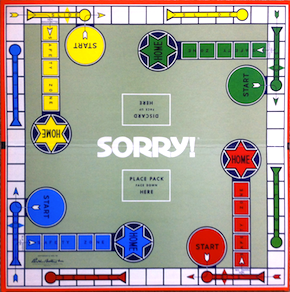
The Vances lived in number seven. They had a different father and mother. They were Eileen’s father and mother. When they were grown up he was going to marry Eileen. He hid under the table. His mother said:
— O, Stephen will apologize.
Dante said:
— O, if not, the eagles will come and pull out his eyes.–
Pull out his eyes,
Apologize,
Apologize,
Pull out his eyes.
Apologize,
Pull out his eyes,
Pull out his eyes,
Apologize.James Joyce, Portrait of the Artist as a Young Man, Chapter 1
Apologies are not hard; they are impossible. From the time we are children, we are forced to say that we’re sorry for things for which we’re not really sorry. When we become parents, we pass this burden on to our children. If we threaten them enough, we can usually extract a reluctant “I’m sorry” that bears the telltale traces of residual self-righteousness. Such apologies are neither said nor heard as apologies, but they are our ritualistic nod to the social contract.

According to NPR, scientists have now proven what we have always known in our hearts: We feel better about ourselves when we don’t apologize:
“When you refuse to apologize, it actually makes you feel more empowered,” [researcher Tyler G. Okimoto] said. “That power and control seems to translate into greater feelings of self-worth.”
Ironically, Okimoto said, people who refused to apologize ended up with boosted feelings of integrity.
But it isn’t ironic to those who know the truth about human nature, or, in Mockingbird terms, to those who hold to a low anthropology. As discussed here before from an interview with Ashley Null, Thomas Cranmer had this insight into humanity almost 500 years ago:
“According to Cranmer’s anthropology, what the heart loves, the will chooses, and the mind justifies. The mind doesn’t direct the will. The mind is actually captive to what the will wants, and the will itself, in turn, is captive to what the heart wants.
“The trouble with human nature is that we are born with a heart that loves ourselves over and above everything else in this world, including God. In short, we are born slaves to the lust for self-gratification, i.e., concupiscence. That’s why, if left to ourselves, we will always love those things that make us feel good about ourselves, even as we depart more and more from God and his ways. Therefore, God must intervene in our lives in order to bring salvation.”
Before we can truly apologize, in other words, our hearts must be transformed. And sorry as I may be to say it, that is not something we can hope to do ourselves.
[youtube http://www.youtube.com/watch?v=aWmkuH1k7uA&w=600]

COMMENTS
2 responses to “Sorry Not Sorry”
Leave a Reply













Love this, it is freedom to hear that I can’t do it and that my hope is in intervention.